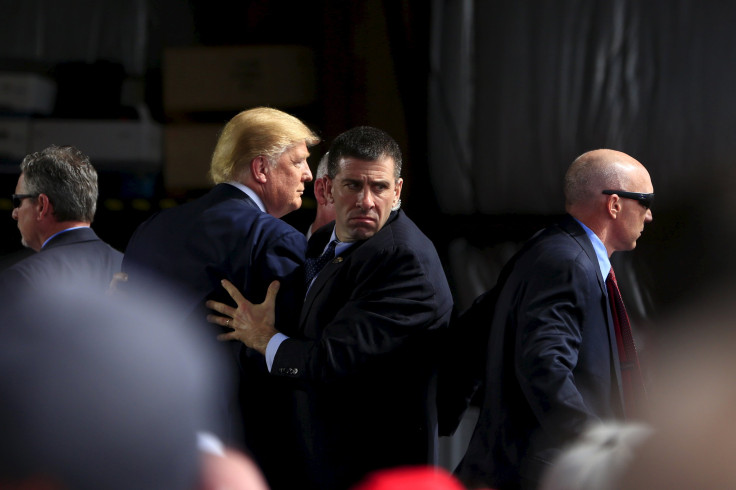Trump Rally Violence: Secret Service Facing Challenges With Campaign Heating Up

As this campaign season has seen increasingly raucous rallies and outbreaks of violence, the Secret Service said this week it is understaffed and overwhelmed as it works to protect the nation's next president. The security challenge comes as a growing number of confrontations, including a recent incident of a man trying to jump a barrier at a rally for Republican front-runner Donald Trump in Dayton, Ohio, has created a charged atmosphere unlike any campaign the agency has seen before, former Secret Service agents said.
“There are challenges to this one that that the Secret Service hasn’t seen before,” said Mickey Nelson, a retired 28-year Secret Service veteran. “Some of the emotions that we saw in Dayton, Ohio, in the jumping of the barricades and getting on stage, we seen that before and we have been prepared for that, but the emotion is really ramping up some of the crowds.”
Protesters have showed up in recent weeks to Trump rallies to demonstrate against the candidate’s perceived racism, and Trump’s supporters have fought back, sometimes leading to pushing and shoving, and in one instance in North Carolina, a protester was sucker-punched in the face by a man in the stands — whom he had not threatened — as he was being hustled out.
Secret Service Director Joseph Clancy said Tuesday the Secret Service is tasked with protecting candidates, and that dealing with protesters and disturbances is the job of local police and security officials, the Hill reported. Meanwhile, the Secret Service is experiencing a staffing shortfall, with 19 agents leaving in the past four months.
Compounding the Secret Service’s troubles is the fact that neither a president nor a vice president — who already have Secret Service details — is running for president this time, meaning additional resources are needed to cover more candidates, which include Trump, Democratic front-runner Hillary Clinton and her challenger, Vermont Sen. Bernie Sanders, Secret Service spokesman Kevin Dye said.
Dye said the Secret Service doesn’t talk about its methods, but explained that different resources get allocated to the president. “The Secret Service sets up security plans at every event the same way,” he said.
The Secret Service bases how much security a person gets on many variables, ranging from the size of a venue where they are to how high a threat level someone in their protection may have, meaning that the president usually has the highest threat level. Even though he is not president, Trump likely has the same threat level because of the high number of online threats against him and the number of protests at his rallies, resulting in him earning a similar security footprint, said Dan Bongino, a former 12-year Secret Service veteran and current contributing editor at Conservative Review, a media group.
“I’m looking at all the assets dedicated to him, and it’s significantly more security,” Bongino said, adding that he has seen more uniformed officers surrounding Trump at events, as well as metal detectors.
“I’ve never seen anything like that,” he said.
Protesters attempt to take stage at Trump rally, Secret Service intervenes https://t.co/Y4CFj4rU8j
— MSNBC (@MSNBC) March 12, 2016
The Secret Service has seen a fair share of controversy itself in recent years. Former Director Julia Pierson resigned in 2014 amid a scandal that developed when an armed Iraq War veteran managed to make it past White House security. This happened not long after a dozen Secret Service agents became embroiled in a prostitution scandal at a Latin America summit in Colombia.
With Trump Wednesday predicting riots if he is denied the nomination, the Secret Service may face more tough challenges this election cycle. While he didn’t cite any candidate by name, Nelson said the emotions and size of the crowds, as well as the number of candidates running, are probably making a difficult campaign for the agency.
“Do I think that every officer out there is highly motivated, well equipped and ready for the challenge of this campaign? Yes," said Nelson, who currently works for the Washington-based Command Consulting Group as a security expert. "But is this one campaign very challenging? Absolutely, and that was demonstrated this past weekend in Dayton."
© Copyright IBTimes 2024. All rights reserved.





















